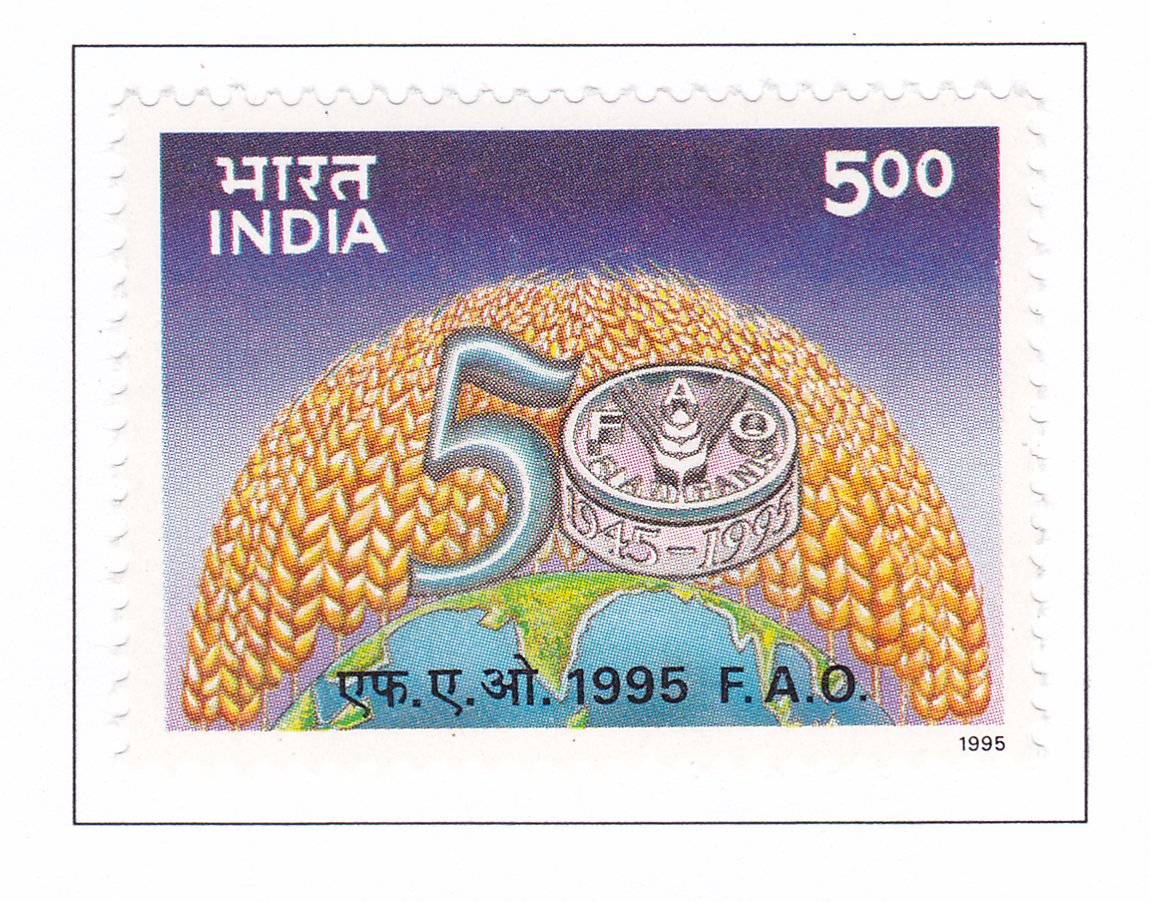50th Anniversary of Food and Agricultural Organisation

Technical Data
| Date of Issue | October 16, 1995 |
|---|---|
| Denomination | Rs. 5 |
| Quantity | 600,000 |
| Perforation | comb 13½ x 13 |
| Printer | Security Printing Press, Nashik |
| Watermark | No Watermark |
| Colors | Multicolor |
| Catalog Codes |
Michel IN 1477 Stamp Number IN 1536 Yvert et Tellier IN 1273 Stanley Gibbons IN 1640 |
| Themes | Agriculture | Anniversaries and Jubilees | Food | Globes | Numbers | Organizations | Seals(Emblems) |
Table of Contents
Commemorative Stamp: 50th Anniversary of the Food & Agriculture Organisation (FAO)
Overview
This commemorative stamp celebrates the 50th anniversary of the Food & Agriculture Organisation (FAO), an apex international organization within the United Nations system. Founded on October 16, 1945, at the Chateau Frontenac in Quebec, Canada, the FAO has played a pivotal role in addressing global issues related to food, agriculture, nutrition, and rural development. This stamp, released by the Department of Post, India, marks both the anniversary of the FAO’s founding and World Food Day, which has been observed annually on October 16 since 1981.
Historical Context and Founding
The concept of a United Nations organization dedicated to food and agriculture began to gain momentum around 1942, during World War II, when the world was facing severe food shortages and agricultural challenges. In June 1943, the United Nations Conference on Food and Agriculture took the decision to form such an organization. The Interim Commission subsequently prepared the FAO’s constitution, which was signed on October 16, 1945. The FAO’s first conference held on that day in Quebec saw 42 nations coming together as founding members, with Sir John Boyd Orr, a renowned scientist in human and animal nutrition, appointed as the first Director-General.
Mission and Activities
The FAO was established with a mandate to:
- Raise levels of nutrition and standards of living.
- Improve agricultural productivity.
- Enhance the conditions of rural populations.
Over the decades, FAO has grown to include 171 member nations and has worked tirelessly to address issues of hunger, malnutrition, and poverty by promoting sustainable agricultural practices, improving nutrition, and ensuring food security. The organization offers direct development assistance, collects and disseminates critical information, provides policy and planning advice to governments, and serves as an international forum for debate on food-related issues.
FAO’s activities are broad and diverse, encompassing areas such as:
- Land and water development.
- Plant and animal production.
- Forestry and fisheries.
- Economic and social policies.
- Investment, nutrition, food standards, and trade.
- Addressing food and agricultural emergencies.
A key priority for FAO is promoting sustainable agriculture and rural development, focusing on the conservation and management of natural resources, along with technical knowledge sharing.
FAO’s Impact in India
India, as a founding member of FAO and a member of its Executive Body, the FAO Council, has benefitted significantly from the organization’s assistance. FAO’s contributions in India have supported the development of sustainable production systems, expansion of the natural resource base, and the diversification of agriculture, especially in rainfed areas that account for 70% of the cultivated land in the country. These areas often face ecological challenges, resource degradation, and poverty.
FAO’s ongoing and future plans in India include:
- Technical assistance for reforestation activities.
- Development of the oilseeds sub-sector.
- Crop diversification.
- Reduction in post-harvest losses.
- Enhancement of food processing and marketing.
- Development of tuna fisheries.
- Application of modern biotechnological approaches to increase and sustain yields in major field crops.
Stamp Design and Significance
The design of this commemorative stamp reflects the FAO’s mission and its global significance. By releasing this stamp, the Department of Post, India, acknowledges FAO’s crucial role in global food security and agricultural development over the past 50 years.
The stamp serves as a reminder of the continued importance of collaborative efforts among governments, institutions, non-governmental organizations, and individuals to achieve long-term solutions to hunger, malnutrition, and poverty—issues that remain as pressing today as they were when the FAO was first established.
